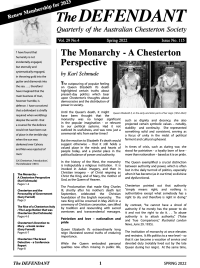
After a two-year COVID-related gap, the Australian Chesterton Society resumed its pattern of annual conferences – on Saturday, October 22, at Campion College in Sydney.
The 16th national conference since 2000, it addressed the theme, “G.K. Chesterton – The Great Detective,” and was attended by nearly fifty people.
Introducing the conference, Karl Schmude commented on the enduring interest in detective fiction – both in literature and TV series – and the extent to which Chesterton’s Fa- ther Brown, Conan Doyle’s Sherlock Holmes, and Agatha Christie’s Hercule Poirot are perennially popular.
He reflected on the idea of Chesterton as “the great detective”, not only as the literary creator of Father Brown, but also as a writer who extended the art of “detecting” to the good as well as the bad.
In an early essay, “A Defence of Detective Stories,” he stressed the value of looking imaginatively at people walking down the street, and how it is “more exciting to hunt their virtues than to hunt their crimes.”
He was alive to the full reality of the human person, “detecting” goodness and virtue, not just evil and vice.
Chesterton built this philosophy into his conception of Father Brown as an unusual character. His detective was a priest who investigates crime, in contrast to the conventional figures of a police officer or a private eye. And he was inspired by a different motive – to redeem the criminal rather than condemn him; to save him, as Chesterton put it, not to slay him.
The opening speaker was Symeon Thompson, resident film critic for News Weekly. Walking down “The Mean Streets of Merrie England” (the title of his paper) he found parallels between Chesterton’s ideas and the hardboiled school of detective fiction expressed cinematically in film noir.
The works of Raymond Chandler and Dashiell Hammett, and their film noir adaptations (starring actors like Humphrey Bogart and Lauren Bacall), may seem at odds with the picture of a benign Chesterton without social awareness. But Symeon showed how this image was challenged by Chesterton’s passionate concern for social injustice and suffering.
Both Chesterton and the hardboiled writers responded to the dehumanising impact of modern industrial society, particularly the alienation resulting from it.
A second speaker was the researcher and author, Richard Egan, who offered a comparison between Chesterton and Dorothy Sayers as mystery writers who were also defenders of the mysteries of Christian orthodoxy.
He showed how both authors saw the connections between unravelling the mystery in a detective story and following the divinely scattered clues in life that allow us to discover the Truth.
A special highlight of the conference was the presentation by the Sydney-based film-makers, Elvis and Heather Joseph, on their feature-length adaptation of Chesterton’s play, Magic. The project was self-funded, with Elvis as writer/ director and his wife Heather as producer.
They showed excerpts from the movie and recounted their long period of preparation to bring different Chesterton works to the screen. In the pipeline they now have two of his novels, The Ball and the Cross and The Man Who Was Thursday.
The session after lunch began with a comparison by Karl Schmude of two detective characters – Father Brown and Inspector Clouseau (played by Peter Sellers in the Pink Panther movies).
Video clips of Clouseau were played which entertained the audience while also revealing the more serious points of contrast with the priest-detective, Father Brown.
Clouseau made his mark as an “anti-detective”. He misread evidence and undermined any investigation by causing confusion among witnesses and suspects alike.
Father Brown’s approach, on the other hand, was to concentrate on the character of the criminal rather than the discoverable details of clues and alibis. As a priest, he peered into the soul of the man. His interpretation of crime was spiritual and moral, not simply material and psychological.
This approach was illustrated in the closing session of the conference when the 1954 British movie, “The Detective,” was screened. It starred Alec Guinness as Father Brown, and the Australian actor, Peter Finch, as the master criminal, Flambeau, who under Father Brown’s influence later reformed and became a detective himself.
